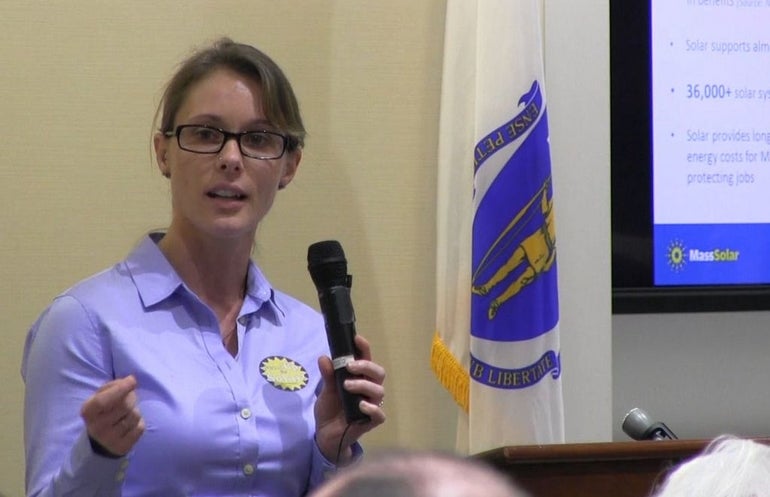As dueling House and Senate solar energy proposals enter their ninth week before a negotiating committee, solar advocates on Thursday cautioned that either bill had the potential to “wipe out” small-scale projects in Massachusetts.
“It’s fair to say that under the governor’s bill, the House bill — the bill that was voted in November — and the Senate bill that was voted on in November, no low-income, municipal solar or community-shared solar project would be economic and would move forward, and you will have wiped out that entire sector,” Erin Rochon, a member of the MassSolar is Working Coalition, told lawmakers and staff during a briefing on Thursday. “I’m pretty sure that nobody wanted to do that when they voted for those bills or even realized that that’s what they were doing, but that’s what each one of those bills does.”
In the last days of formal sessions for 2015, both the House and Senate passed bills to lift the cap on the amount of publicly and privately generated solar power that can be sold back to the grid at retail rates, among other measures. Negotiators were tasked with working out the differences between the two pieces of legislation, including the size of the payment solar owners receive for electricity delivered to the grid.
The cuts to compensation and other provisions in the legislation could make solar development unprofitable, said Rochon, the director of energy and environmental policy at Boston Community Capital.
She said a municipal solar installation in Lexington currently yields about $73,000 a year in energy savings. Under the policies proposed in the House bill, the solar field would lead the town to instead owe an extra $116,000 in energy costs, according to MassSolar estimates.
“If you pay solar projects what the House bill was looking to pay, the vast majority of solar projects in Massachusetts will not work,” said Larry Aller of Next Step Living.
The potential to discourage solar development in Massachusetts has been a common refrain from the industry and supporters throughout the debate over the legislation. Backers of the House and Senate solar bills have said the proposals strike a balanced approach between the interests of ratepayers and the solar energy industry.
In their presentation, MassSolar representatives urged legislators to consider benefits of solar energy along with its costs, pointing to lower prices for centrally generated power that would be driven by a drop in demand if more people and entities adopt solar.
Rep. Jonathan Hecht, who hosted the briefing with Rep. Frank Smizik and Sen. Jamie Eldridge, was one of two representatives to vote against the House bill in November. Hecht told the News Service he would like see the Department of Energy Resources or the Department of Public Utilities conduct a study to objectively determine the value of solar energy.
“In the interim, we do need to address the question of the caps,” Hecht said. “I think the most prudent way to move forward would be to do a cap raise — it could be an interim cap raise — while a value of solar study is conducted.”

